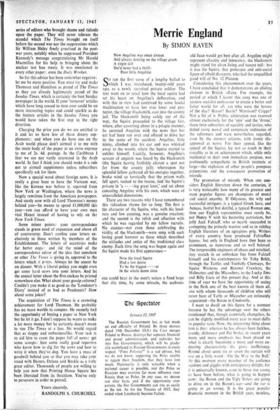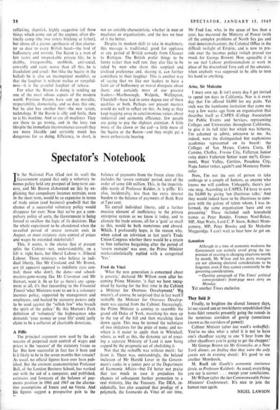Merrie England
By SIMON RAVEN
Now Angeline was sweet sixteen
And always dancing on the village green.
A virgin still She'd never had a thrill: Poor little Angeline.
CO ran the first verse of a lengthy ballad to ',which I was introduced, twenty-odd years ago, as a newly recruited private soldier. The text went on to retail how the local squire had set his heart on Angeline's defloration, and with this in view had contrived by some feudal machination to have her true lover and pro- tector, the village blacksmith, cast into the county jail. The blacksmith being safely out of the way, the Squire proceeded to the village fair, where, after cavorting about in a priapic manner, he accosted Angeline with the news that her cat had been run over and offered to drive her to the scene of the accident. Angeline, little ninny, climbed into his car and was whisked away to the woods, where the Squire started to • exhibit himself. Luckily, however, Angeline's scream of anguish was heard by the blacksmith (the Squire having foolishly chosen a spot not far from the county jail); whereupon the splendid fellow gathered all his energies together, broke wind so heroically that the prison walls fell apart, rushed to the rescue, tied the Squire's privata in 'a - - ing great knot,' and set about consoling Angeline with his own, which were of unparalleled dimensions.
There are two reasons why I have remembered this ridiculous rhyme for so long. The first is the character of the Squire, who, with his lewd- ness and low cunning, was a genuine creation; and the second is the relish and affection with which he was regarded by my fellow recruits. No stanzas—not even those celebrating the virility of the blacksmith—were sung with such loving good humour as those which described the attitudes .and antics of this traditional class enemy. Each time the song was begun again and the Squire made his first appearance—
Now the local Squire Had a low desire To be the biggest - - - - er In the whole damn shire one could hear in the men's voices a fond hope - that this time, by some miracle, the scabrous
old Juan would get best after all. Angeline might represent chastity and innocence; the blacksmith
might stand for clean living and honest toil: but it was the Squire, that grotesque and anti-social figure of ribald disrepute, who had the unqualified good will of No. 12 Platoon.
Considering this phenomenon over the years, I have concluded that it demonstrates an abiding element in British affairs. For example, the period at which I learnt this song was one of austere socialist endeavour to create a better and
fairer world for all; yet who were the heroes of the day? Bevan? Bevin? Morrison? Cripps? Not a bit of it. Public admiration was reserved
almost exclusively for the 'spiv' and the 'drone,' those twin subverters of equality and justice, who defied every moral and sumptuary ordinance of
the reformers and were nevertheless regarded, even by the sternest citizens, with ironic dis- approval at worst. For their appeal, like the appeal of the Squire, lay not so much in their rascality as in an achievement which, while only incidental to their own immediate purpose, was profoundly sympathetic to British instincts at large—the explosion of other people's pompous pretensions and the consequent promotion of misrule.
The promotion of misrule. When one con- s id ers English literature down the centuries, it is very noticeable how many of its greatest and most popular figures are champions of moral and social anarchy. If Odysseus, the wily and successful intriguer, is a typical Greek hero, and Aeneas, lustful but dutiful, a typical Roman one, then our English representtive must surely be, not Henry V with his hectoring patriotism, but jolly Jack Falstaff, who so nearly succeeded in corrupting the princely warrior and so in ridding English literature of an egregious prig. Writers of every country have produced Falstaffilin figures: but only in England have they been so prominent, so numerous and so well beloved. The irrepressible engineers of chaos and mischief, they stretch in an unbroken line from Falstaff himself and his contemporary Sir Toby Belch, through the Tattles and Tunbelly Clumseys, the Squire Westerns and Baronet Crawleys, the Melmottes and the Micawbers, to the Lucky Jims and Billy Liars of this present day. And at this time of year we have the opportunity of seeing in the flesh one of the best known of them all, one with whom thousands of children who will never hear of Tattle or Micawber are intimately acquainted—the Baron in Cinderella.
I want to dwell on this figure for a moment because he has the advantage over the others mentioned that, though essentially changeless, he can be slightly modified every year to meet shifts in popular taste. Now, the interesting thing about him is this : whereas he has always been feckless, greedy, dishonest and flat broke, in recent years more and more emphasis has been placed on what is clearly becoming a more and more en- dearing characteristic—his gross inefficiency. Round about scene six or seven the curtain will rise on a little wood—'0n the Way to the Ball.' At this moment every member of the audience squirms and giggles with anticipatory delight, for it is universally known, even to those too young to have been before, what is going to happen now : the Baron and the Ugly Sisters are going to drive on in the Baron's car—and the car is going to go wrong. It is the great popular dramatic moment in the British year, tasteless,
rollicking, slapstick, highly suggestive (all those things which come out of the engine), often dis- tinctly camp (the two sisters bitching at father), but above all a joyous apotheosis of that charac- ter so dear to every British heart—the lord of buffoonery and misrule. The Baron is a man of low tastes and unspeakable private life; he is shabby, irresponsible, snobbish, anti-social, cowardly and vain; worse than all this, he• is fraudulent and cruel: but (like the Squire in the ballad) he is also an incompetent muddler, so that the laughter is without malice or vengeful- ness—it is the grateful laughter of release.
For what the Baron is doing is sending up one of the most odious aspects of the modern world. Previous Barons have sent up morality, respectability, domesticity, and so does this one, but he also has another butt—the new tyrant, technology. If the Baron is silly and futile, then so is his machine. And so are all machines. They are there to go wrong, and in the long run (despite the immediate inconvenience caused) they are more likeable and certainly much less dangerous for so doing. Efficiency, in short, is not an amiable characteristic, whether in men or machines or organisations, and the less we hear of it the better.
Despite its modern shift to take in machinery, this message is traditional, good for applause at any period of British comedy from Chaucer to Rattigan. The British prefer things to be funny rather than well run; they also like to be ruled by men who share this sceptical and civilised preference and, sharing it, can further contribute to their laughter. This is another way of saying that we like our leaders to have a faint air of buffoonery or moral disrepute about them; and certainly most of our greatest leaders—Marlborough, Walpole, Wellington, Churchill—have had in some degree one of these qualities or both. Perhaps our present masters would do well to reflect on this. As long as they keep nagging away in sanctimonious voices about industrial and economic efficiency, few people are going to pay the slightest attention: A little more of the clown or the cad—a little more of the Squire or the Baron—and they might get a more enthusiastic hearing.































 Previous page
Previous page